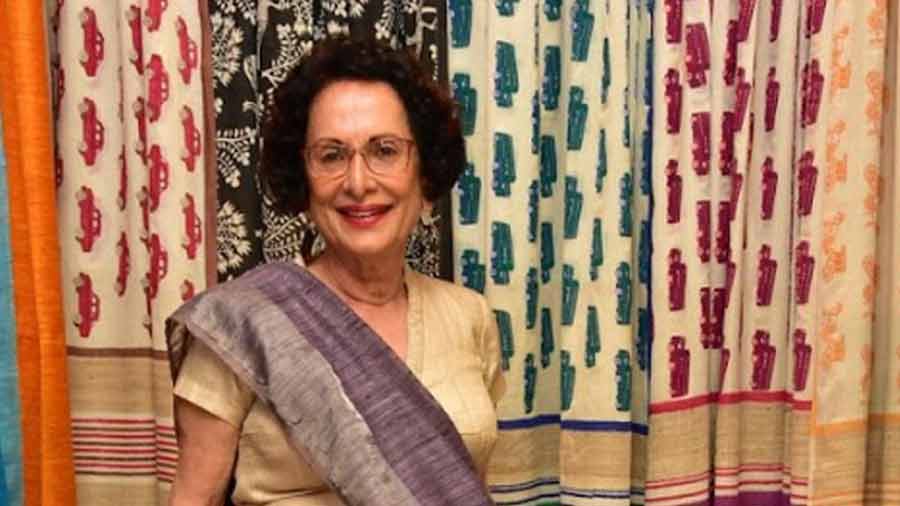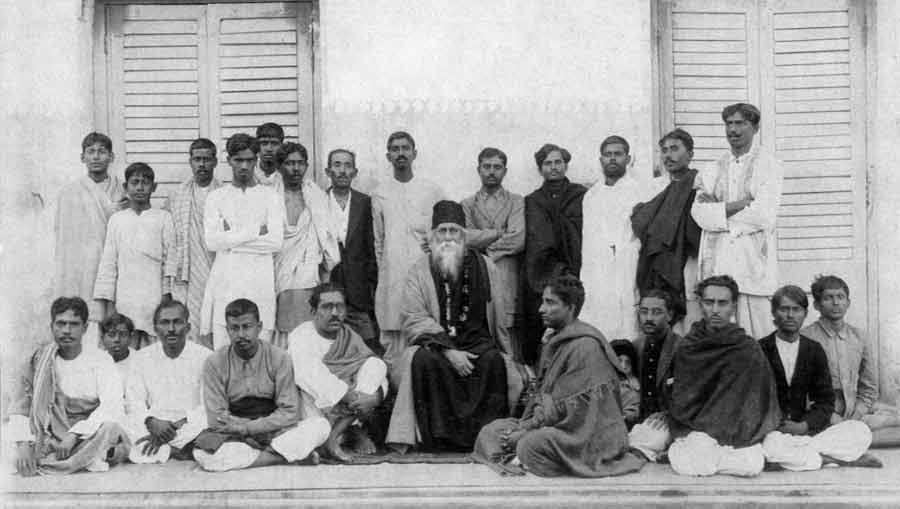For more than five decades, Bachi Karkaria has been putting people in their place. Her columns, biting and brilliant in equal measure, have seldom pulled any punches. But it is not just her journalistic and satirical talents that have made her a voice of distinction. It is also her ability to cement relationships and understand those around her that have given her access to rare vantage points from which to explore and tell still rarer stories.
One such story that Bachi has documented is that of C.P. Krishnan Nair, the man who could do it all. In her latest book, Capture the Dream (published by Juggernaut), Bachi delves into Nair’s journey and how he went from representing the Indian Army to helming a successful handloom business to running a hotel chain to reckon with.
My Kolkata caught up with Bachi to get her take on what made Captain Nair a colossus, her ideal hospitality experience, her assessment of the old and the new Kolkata, what satire should do and more.
Edited excerpts from the conversation follow.
The chutzpah of the Rai Bahadur and the Captain was something else
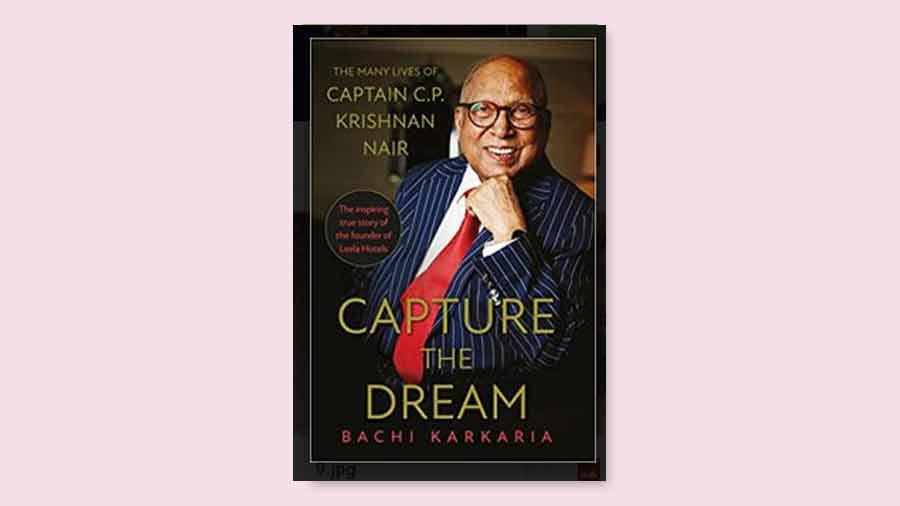
In 'Capture the Dream', Bachi unravels the many lives of C.P. Krishnan Nair Amazon
My Kolkata: After Rai Bahadur M.S. Oberoi and Dare to Dream, C.P. Krishnan Nair and Capture the Dream. Was it a conscious choice to repeat the word “Dream” to connect the two hospitality doyens?
Bachi Karkaria: Not at all, my first choices for the Captain Nair book were Curry and Caviar and For Guest and Country. The family wanted a different title, which the publisher Juggernaut did not like, so we compromised on Capture The Dream. Yet, it became a serendipitous connection between the Rai Bahadur and the Captain. The latter broke his path later, but his contribution to the hospitality sector was nonetheless pioneering in the way his hotels consciously showcased India – the grand past through architecture and artefacts as well as the robust present through top-drawer systems and service.
What is the most striking similarity and the most striking difference between the two as personalities and in how they Dared to Capture their Dreams?
Their common trait was their audacity. Both typified Robert Browning’s line, “Ah, but a man’s reach should exceed his grasp, or what’s a heaven for?” No enterprise can be built without passion, but the chutzpah of these men was something else. The India story is replete with examples of rags-to-riches, but these guys leapt over their modest origins to rewrite definitions of luxury altogether. They did so in a way that forces your imagination to take the same long jump. M.S. Oberoi got his lucky breaks from external crises. For example, Kolkata’s Grand Hotel fell into his hands because Stephen Aratoon’s iconic pile had been felled by a cholera outbreak; WWII soldiers taking an R&R break here brought in so much cash that it had to be stuffed into mattresses. Similarly, the Bombay property threatened to bankrupt his entire company because he had paid a staggering price for the land and construction, but it became another cash cow thanks to the Beirut War, which diverted rich Arab holiday makers to India’s western metropolis.
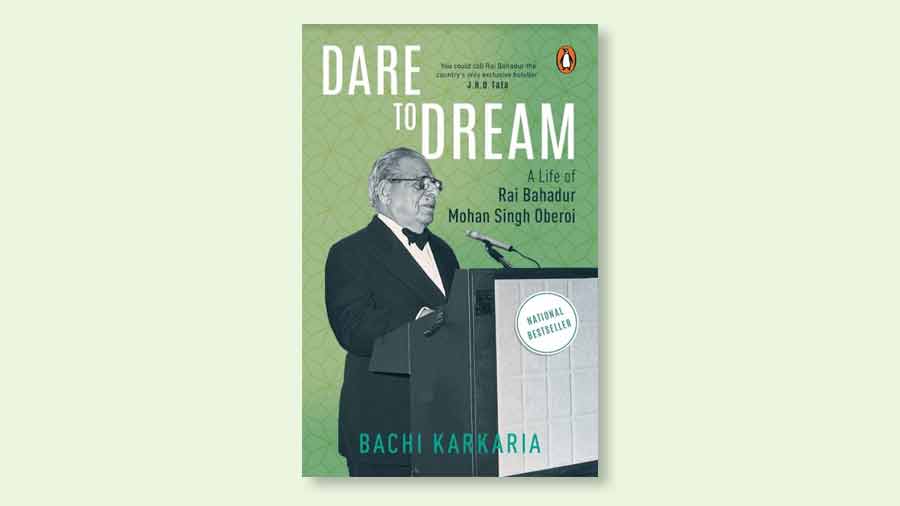
Bachi’s book, 'Dare to Dream', provides the inside story of the hotelier M.S. Oberoi
Sir Dorabji Tata’s exclamation over his bid, “Rai Bahadur, have you gone mad!”, would apply several times over to the amount Captain Nair was prepared to spend to capture his dreams. But in the Captain’s case, the external crises were more cruel – the Lehman Brothers’ bankruptcy, the global economic downturn, the 2008 Mumbai attacks. But, of course, the big difference was the number of careers the Captain took on and aced before his ultimate dream.
Tommy Hilfiger’s founder dropped in to have coffee with the Captain
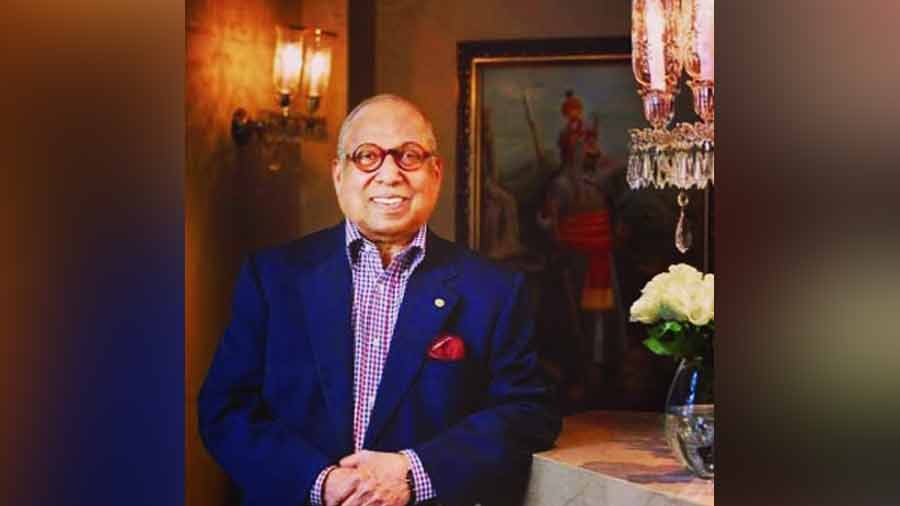
According to Bachi, energy, generosity and empathy were the core traits of Captain Nair TT Archives
From fighting for Independence to managing handloom to creating a magnificent chain of hotels, the Captain was an incredibly versatile man with a wide range of skills. What would you consider his core traits that made him stand out in all his endeavours?
Yes, those careers really were remarkable. Frankly, it was the sheer range of his pre-hotel life and what he achieved in each of his roles – also the panoply of eminences who influenced him – that prompted me to take up his biography. His serial “door-opener” was V.P. Menon. He was ADC to General K.S. Brar. He later became the biggest Indian exporter of ready-to-wear materials to the US, supplying all the big labels such as Gloria Vanderbilt, Brooks Brothers and Tommy Hilfiger, whose founder even dropped in to have coffee with the Captain on the latter’s last visit to New York City at age 90. He couldn’t have done all he did without the ability to dream big and pull out all the stops to capture his dreams. His core traits would also include his unflagging energy, unwalled generosity and a genuine empathy towards people, where status and age was no bar.
No one inspired Captain Nair like Netaji
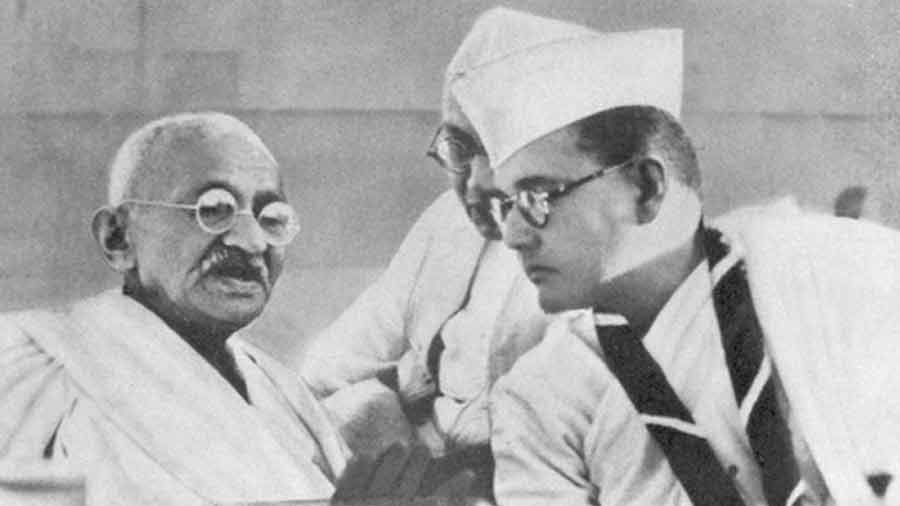
Captain Nair interacted with Gandhiji among other freedom fighters, but nobody impacted him quite like Netaji TT Archives
You mentioned the eminences who influenced him, so how was Captain Nair’s perception of, and relationship with, Subhas Chandra Bose? Would it be fair to say that he admired Netaji more than any other freedom fighter?
Absolutely, 100 per cent. The thing is that the Captain never interacted with Netaji personally, the way he did with V.P. Menon, the Frontier Gandhi Abdul Ghaffar Khan, less so Gandhiji and briefly with Jawaharlal Nehru and M.A. Jinnah. But, decidedly, no one inspired him like Netaji, right from the time he was first thrilled by Netaji’s speeches from Singapore on Sholen Radio, when Nair was a young, civilian wireless officer in Abbottabad, on his first job.
There are many fascinating stories in Capture the Dream about how Captain Nair and the Leela group overcame seemingly insurmountable obstacles time and again. What would be your favourite story from these?
Wow, that’s a tough choice! I think I’d choose the problems he had with his Udaipur hotel. Money was always an issue, because he had already overspent on the previous one. In Bangalore, for example, he added more rooms when he was told to cut back because Rs 200 crores were locked up on account of a stuck deal with Delhi’s HUDCO. In Udaipur, he also fought a prolonged legal battle with environmentalists – ironically he was awarded the Maharana Uday Singh award for his signature greening efforts around the same time. Then, when the hotel was ready, Lake Pichola dried up for the first time, stymying access; so, he had to build a whole road, which entailed the tortuous business of acquiring land and the houses that stood on it. Pretty much every hotel of his faced similar issues. The Urban Land Ceiling Act in Mumbai, the Coastal Regulation Zone Act in Goa, heritage structures in Kovalam. Powerful politicians were always in the picture, either as obstructors or saviours.

Bachi singles out The Leela Palace in Udaipur as being Captain Nair’s most challenging hospitality project The Leela Group
What role did the Captain’s wife, Leela Nair, play in his journey? How would you characterise her presence in his life?
In one word, “major”. This indomitable woman was instrumental in all the careers he took up, bar the army, which she made him leave because she didn’t think he “should be spending the rest of his life saluting all and sundry”. When Leela willed something, Captain Nair had to find the way. They were temperamentally so different, she reserved, he the flamboyant extrovert, but they were true soulmates.

Captain Nair named his chain of hotels after his “indomitable” wife Leela Nair The Leela Group
Ideal hospitality is about the Goldilocks Factor
How would you assess the impact of Covid-19 on Indian hospitality? Will there be a long-term impact of the pandemic on the hospitality sector?
Hopefully not. Occupancy is high once more, restaurants are buzzing, but one more wave will knock it down again. The hospitality sector gets hit when travel is hit, keeping away tourists and business persons. Truly, when the economy sneezes, the hospitality industry is among the first to catch a cold.
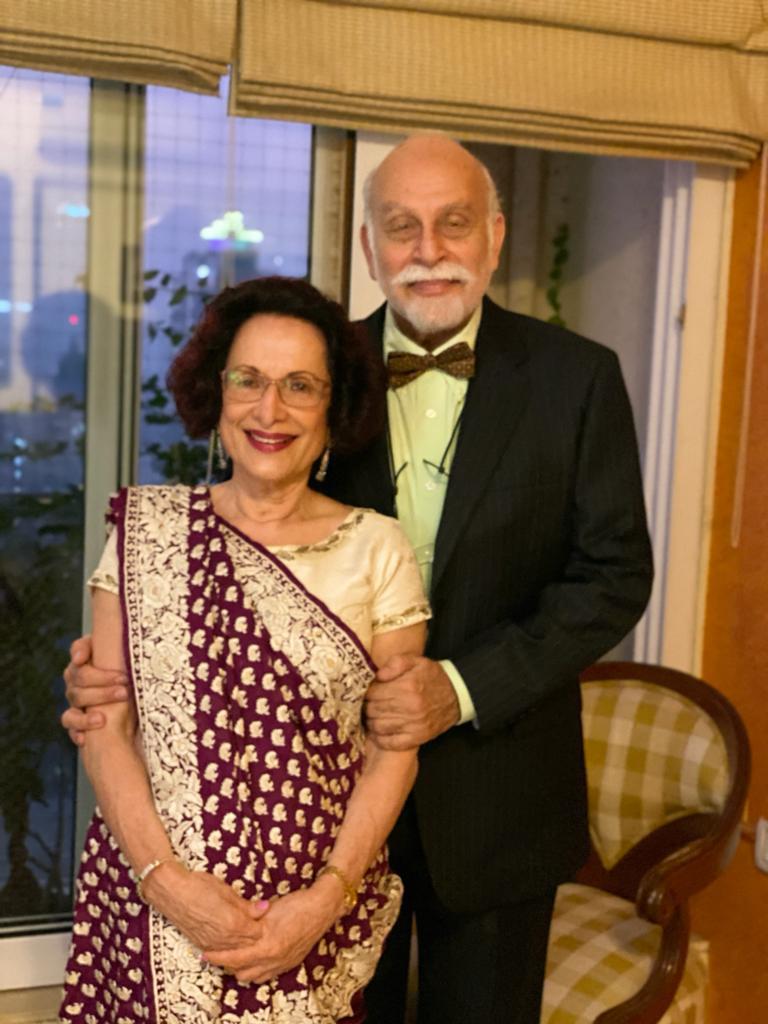
Bachi in traditional Parsi gara with partner Dinyar Modi Bachi Karkaria
Describe what constitutes your ideal hospitality experience. What are the items on your checklist when you check into a hotel?
I would call it the Goldilocks Factor. Beds not too hard, not too soft; air conditioning not too cold, shower pressure not too strong, not too weak. Staff that treads the fine line between friendliness and familiarity. If I’m on holiday, then certainly I want a memory to cherish; if on work, I want room service and ironing on time. And yes, I really do want a room with a view. Better still, gardens to walk about in because I find hotel rooms with “Do Not Open” windows stifling. Here, Leela scores big because Captain Nair, more than any other hotelier, was such a passionate gardener. He never came back from his travels without seeds and saplings, on occasion two suitcases full, as my chapter “I Ever Promised You A Rose Garden” elaborates.
I like to think I played a part in Taj Bengal actually getting off the ground
Which is your favourite hospitality destination in Kolkata and why?
This is really a case of Sophie’s Choice! I’ve got such a close connection with all the main hotels. The Oberoi Grand for obvious reasons. In fact, my first book was To A Grand Design, which led to the Rai Bahadur biography.
I like to think I played a part in Taj Bengal actually getting off the ground; those old enough will recall that the project was hopelessly mired in controversy – spawned by rivals – that it would obstruct the flight path of the birds who migrated in thousands to the Alipore Zoo lake. My investigative report in The Statesman, where I worked through the 1980s, was the first to expose the absurdity of that claim; the clipping joined the evidence which the Taj group placed before the court.

Taj Bengal, Kolkata, may never have been were it not for an important contribution from Bachi Taj Hotels
During my stint in Delhi as the Times of India RE, I got to know Priya Paul of The Park who asked me to write a book on Flurys – which is entwined into every Kolkata babalog childhood. More so in mine because my father’s Navroz Printing Works did all their stationery, which meant the then white-and-blue box was a permanent fixture in our home.
As for ITC, I’ve had a really long relationship with them, starting with the wonderful Shona Adhikari in the 1970s and going on to Gautam Anand, who took great pity on this Parsi carnivore living in Jain House during that same Delhi chapter of 2003-05.
Why do you think the Leela group steered clear of Kolkata?
Frankly, I never asked. Maybe the city just wasn’t among Captain Nair’s priorities.
I really bloomed in Loreto with debates and dramatics
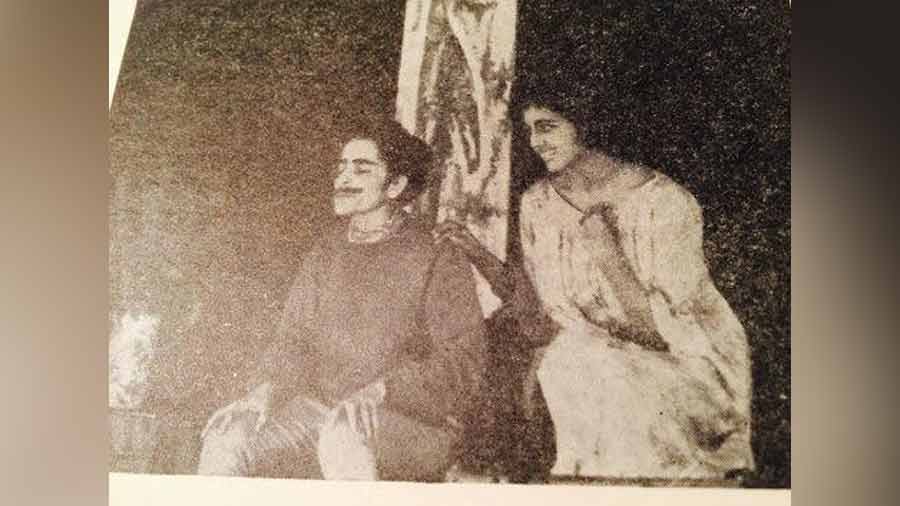
Bachi (L) enacting Somerset Maugham’s play Home and Beauty, for which she won the best actress award at an inter-college competition in IIT Kharagpur Bachi Karkaria
What are your favourite memories from your time in Kolkata? How fondly do you look back on your days at Loreto College?
You’ve again put me in a bind. How can I pick from the myriad memories that coalesce into the magic of growing up?
I think I really bloomed in Loreto with debates and dramatics. I was supremely lucky in that I returned to Kolkata for 10 years after leaving home a decade earlier to join the Times group as a trainee. My Kolkata visits are centred on my Loreto College friends – Tini Soi, Rita Bhimani, Aruna Kapur, Krishna Sen and Chitra Bir. I always have a superlative meal with the ever-gracious Rakhi Sarkar, and of course, I catch up with the 70mm-hearted Usha Uthup. From my Statesman years, I regularly meet my once-lofty-editor-now-more-human Sunanda Datta Ray and, more so, his wife Sumita.
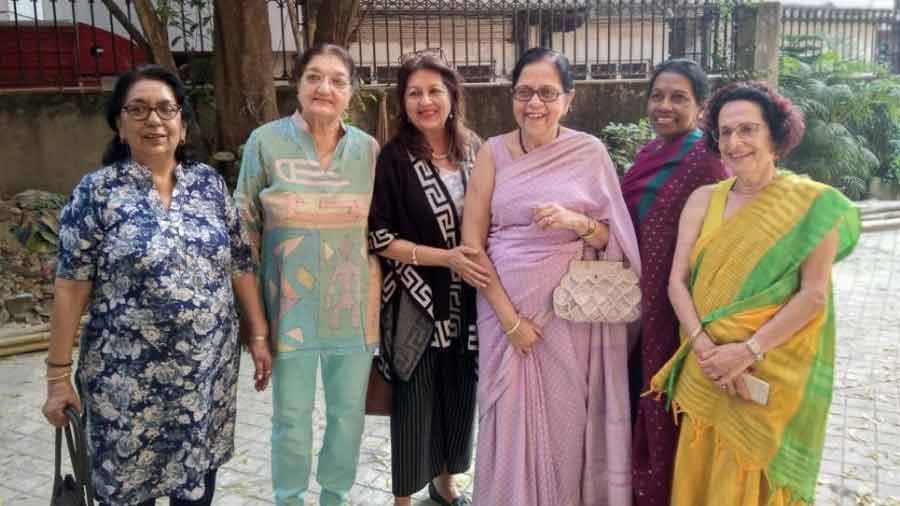
Bachi with her still-close friends from Loreto College (L to R) Tini Soi, Aruna Kapur, Rita Bhimani, Chitra Bir and Krishna Sen Bachi Karkaria
I can happily reinforce these friendships because I now return to Kolkata every year with my post-divorce partner, Dinyar Modi, who was also part of my youth in the city. He left Kolkata after college – St. Xavier’s, of course – articled and worked in London for over 50 years, but has now bought a flat in Sunny Park. I’ve added his old school buddies among my friends, too.
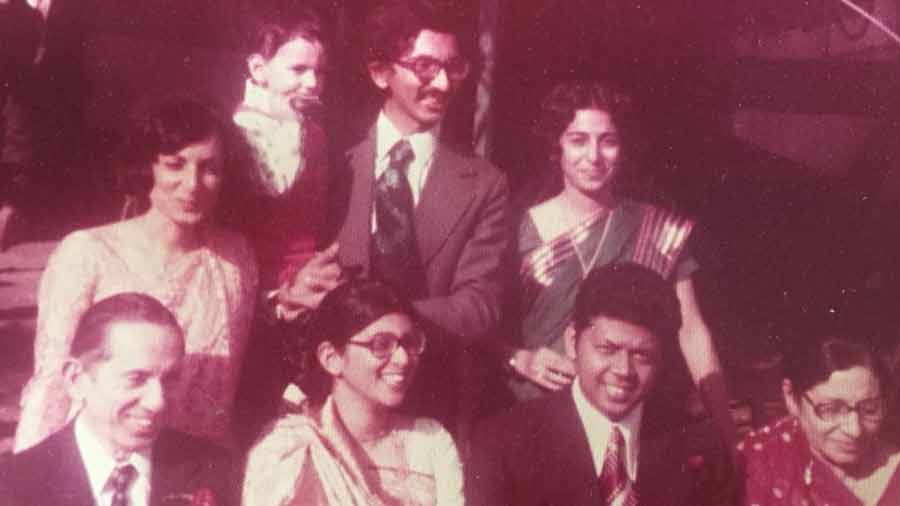
At the wedding of Yasmin, Bachi’s younger sister. Seated (from left) are Bachi’s father Navel Kanga, Yasmin and her husband Sudev Das and Bachi’s mother Jaloo. Standing (L to R) are Bachi and Jehangir with their two-year-old son Urvaksh and Bachi’s youngest sister Persees Bachi Karkaria
And do you also have a lot of family left in Kolkata?
Alas, only my younger sister Yasmin and her husband Sudev, who always gives me a great Bengali lunch. My youngest sister Persees is impossibly far away in New Zealand. Dinyar’s brother and family live in an imposing red bari on Lovelock Street. The fast diminishing Kolkata Parsi community links me to my family’s past.

Bachi’s younger son Rishad with wife Akshata, their children Kahaan and Kabir and pet dog Luka Bachi Karkaria
Park Street has got its mojo back
In all your time of seeing Kolkata, tell us one way in which it has changed for the better and one way in which you miss the old Kolkata.
For the better, it’s catching up with the 21st century. It’s much more energised than it was during the days of cholbe na, gheraos, Naxalbari and power cuts that plunged the city into frequent darkness. It’s even brighter physically nowadays, tired buildings flaking their way to decay are restored and painted – albeit often with Didi’s blue and white. Park Street has got its mojo back.
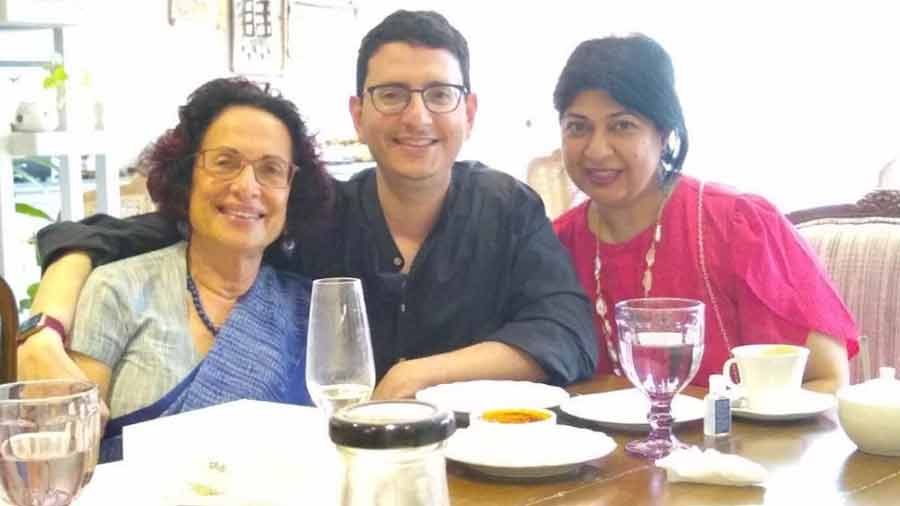
Bachi with her older son Urvaksh and his wife Anisha Bachi Karkaria
What do I miss? The old “culture” has all but disappeared. As has the chhotto shingara. And Skyroom’s gone completely. But I will desist from wallowing in nostalgia – my home city’s most endearing marker. And its longest surviving industry!
The stiletto thrust of satire… and some really sharp arrows
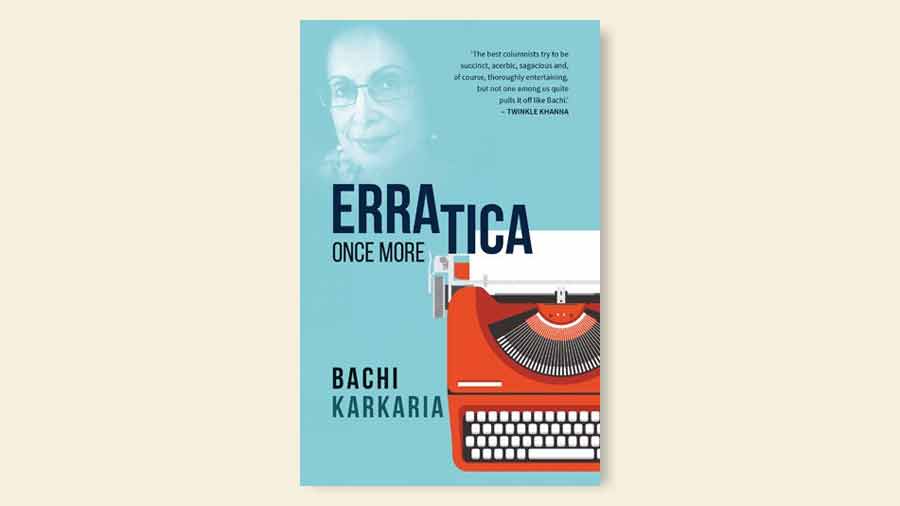
'Erratica Once More', a collection of Bachi’s trademark satire columns
Your satire column Erratica has been entertaining readers for decades with its acerbic wit and humour. But are you worried that satire as a genre is dying a quick death in Indian journalism? Should satire solely become the domain of the comedian or can it still be a prominent part of mainstream journalism in the country?
As long as there are pompous gas bags, there will have to be the stiletto thrust of satire. Yes, my own “ban-width” is increasing, with pressure not to write on “No. 1 & 2”, ED, IT… but there are ways of getting around it.
Has satire become the sole “domain of the comedian”? Stand-up comics have become shut-up ones. The strongest ones are braving the bullets, but the oppressive atmosphere deters fresh talent. It would be a pity if this genre succumbs again to crude ethnic or anatomical jokes.
Yet, remember, the sharpest cartoons have emerged from the most authoritarian furnaces, so, not that I want things to get any hotter, it’s just that we’ll have to work harder, be subtler, and hope the reader antennae will become correspondingly sensitive to catch it. Even today, right here, the internet bristles with some really sharp arrows.
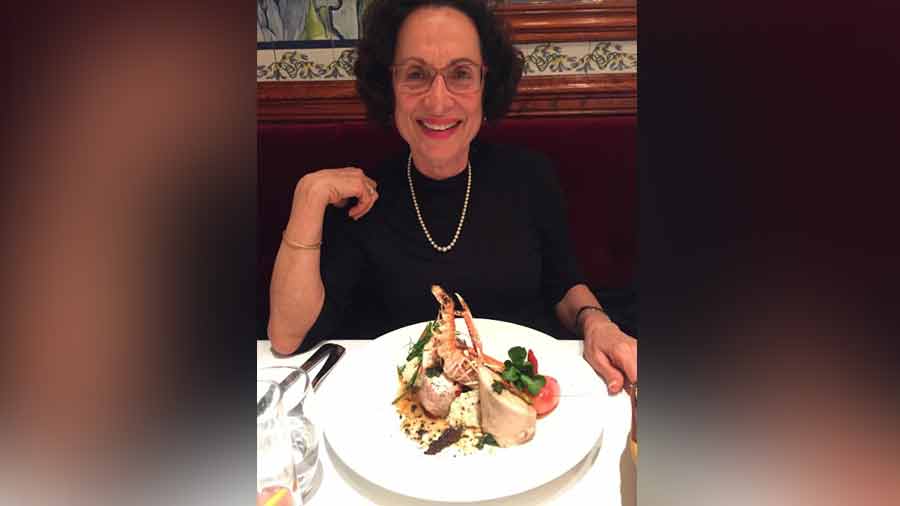
“Check, check and re-check” is the mantra of good journalism for Bachi, seen here having dinner in Lille, France Bachi Karkaria
Facts and credibility will never go out of style
What advice and/or tips would you have for aspiring journalists? What are the most important skills they need to work on to have a successful career in today’s media environment?
With the growing footprint and power of social media, the amateur is driving out the professional. So journalists have to up their game. Walk the extra mile, ask the next question. For a 500-word piece, get enough material for a 1,000-word piece, so you can distill the best.
Styles have changed dramatically, but facts and credibility will never go out of style; so check, check and re-check. Write a story because it needs to be written, not because it serves an extraneous agenda. Passion is critical, but also compassion. Keep learning, no other job offers you the same extent and depth. Finally, enjoy yourself – then, as the cliche goes, you’ll never work a single day.
Catch Bachi Karkaria discuss the life, the times and the hotels of Captain Nair at the Kolkata Literary Meet on March 27
